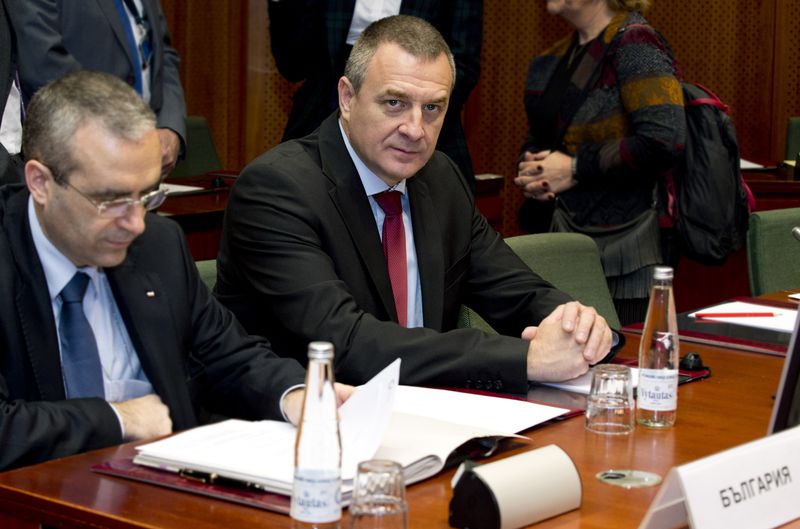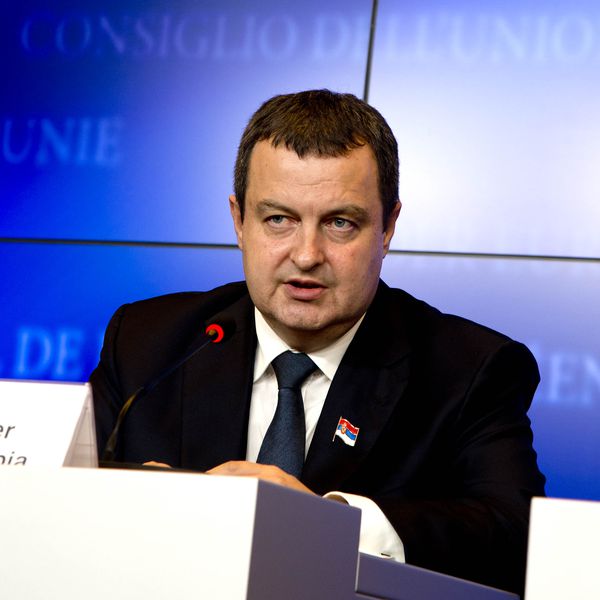European Integration Winter in the Western Balkans
Adelina Marini, December 7, 2013
 The European Union is on its way to become less attractive for the Western Balkans and the Western Balkans themselves are less wanted for the EU. To such a conclusion brings the decision of the justice and home affairs ministers of December 5th to adopt the amendments to the Council regulation on visa liberalisation. The amendments introduce a "suspension mechanism" or a safeguard clause which allows for temporary reinstatement of the visa regime for all countries from the visa liberalisation list, among which are the Western Balkan countries as well. The mechanism will be triggered when a member state signals that in the course of six months it was facing a strong influx of citizens from third countries, mostly in the form of irregular migrants, unjustified asylum requests or rejected readmission applications.
The European Union is on its way to become less attractive for the Western Balkans and the Western Balkans themselves are less wanted for the EU. To such a conclusion brings the decision of the justice and home affairs ministers of December 5th to adopt the amendments to the Council regulation on visa liberalisation. The amendments introduce a "suspension mechanism" or a safeguard clause which allows for temporary reinstatement of the visa regime for all countries from the visa liberalisation list, among which are the Western Balkan countries as well. The mechanism will be triggered when a member state signals that in the course of six months it was facing a strong influx of citizens from third countries, mostly in the form of irregular migrants, unjustified asylum requests or rejected readmission applications.
The good news in this decision is that the mechanism will not be triggered automatically, but after a thorough assessment by the European Commission and also that the reinstatement of visa regime will be temporary. The ministers in the Justice and Home Affairs Council (JHA) discussed the issue during lunch on Thursday after the Commission presented its fourth report on the post-visa monitoring mechanism for the Western Balkan countries. The quoted in the report data, however, show quite clearly that the EU policy of the stick and carrot is turning into a genuine realpolitik - carrot only after specific actions. When there is a lack of such actions the stick comes at hand.
2012 marks a record in misuses with the visa liberalisation regime. According to Eurostat, citizens of the Western Balkan countries represent some 13% of all the asylum applications in EU member states and the Schengen associated countries. Approximately 92% of the applications are filed in six of the member states and those participating in Schengen. Those are Germany, Sweden, France, Switzerland, Belgium and Luxembourg. Only in a year the asylum applications in Germany rose 143 per cent to 22 715 people. In Sweden the growth is more modest - 31% or 6 410 people. France also registered a huge jump in applications of 133%, but in numbers the candidates are much less than in Germany - 5 505 people. In Switzerland the increase is also 31 per cent, while in Belgium and Luxembourg there is even a shrink of 36% and 9% respectively.
Rule of law is the key
The unfounded asylum applications are only the tip of the iceberg. The reasons that have led to this decision, which is being prepared for quite some time, are much deeper. The visa free regime entered into force for the citizens of Macedonia, Montenegro and Serbia on December 19th, 2009, and the European sun shone for Albania and Bosnia and Herzegovina a year later - on December 15th 2010. The decision to give a chance to the citizens of those countries to freely travel across the EU was taken after a "thorough" assessment, according to the European Commission's opinion, of these countries' progress in fulfilling the criteria in their road maps for visa waiver. The requirements are painfully familiar while progress is arguable: documents security, border and migration management, asylum, fight against organised crime and corruption, fundamental rights related to freedom of movement.
As it became clear from the annual progress reports for the enlargement package however, either the Commission has low criteria or it offered the carrot too soon. In the fourth report on the post-visa liberalisation monitoring mechanism, prepared on November 28th, again an evaluation is made on a country by country basis. It shows that in Albania one of the greatest problems is the change of names with the aim to avoid border control. The Albanian authorities adopted a law on the civil registry which now requires the Albanian citizens to provide a certificate from the border police to prove that they are not in the Schengen ban list to be able to apply for a change of the name. Between June 2012 and  March 2013 almost 34% of all the 5 763 applications for name change were rejected precisely on such grounds.
March 2013 almost 34% of all the 5 763 applications for name change were rejected precisely on such grounds.
Albania has to also tackle the document fraud problem and more specifically the use of fake stamps at EU's external borders and the use of fake passports of Albanian citizens. This, the Commission believes, remains a significant problem. Albania is not at all among the champions in the fight against organised crime, where the Commission reports "some progress". The experience with reports so far shows, though, that this category of progress is rather closer to zero. The Commission believes that what Albania needs in this area is an "urgent need" the key institutions to cooperation with each other and to increase their capacity to investigate serious and organised crime.
Regarding the other criteria the EU monitors, Albania scored progress in the fight against drugs, some progress is registered also in the fight against human trafficking, although it is noted that the internal traffic remains a problem. Progress is also "some" in the fight with money laundering, while in the area of fundamental rights progress is "uneven". This means that there is progress in the rights of women and anti-discrimination, but it is limited in terms of Roma inclusion.
In Bosnia and Herzegovina the situation is similar. Progress is reported in document security and migration. The country has prepared a new strategy to fight organised crime, but this is the only progress in this area. There is a lack of institutional capacity to coordinate and lead the fight against drug trafficking. A new strategy was adopted and an action plan to fight human trafficking. What is curious here is that the provisions regarding trafficking of humans are integrated in the penal codes of Republika Srpska and the Brcko region, while in the other provinces and at federal level this has not been done yet. The report also outlines the lack of efficient measures to prevent money laundering and financing of terrorist activities. The implementation of the anti-corruption strategy is also delayed, the European Commission report says.
Macedonia, too, scored progress in document security. A problem, however, is handling the migration flows especially against the backdrop of a growing number of migrants going transit through the country. In 2012, 682 irregular migrants were detected, while for the first two months of this year their number was 111. The fight against organised crime is hampered at organisational level because the specialised centre for the fight against organised and serious crime to the Ministry of the Interior has problems to recruit staff. On the other hand are the obstacles before the efficiency of the prosecutors, who have no direct access to the data bases of law enforcement bodies. There is no independent and external mechanism to monitor the work of the police. Regarding corruption, Macedonia's legal framework was enhanced last year in the part related to conflict of interest.
Montenegro, which is negotiating for EU accession under the new programme - opening chapters 23 and 24 first - also has serious problems which are in the foundation of the demand for a suspension mechanism for the visa liberalisation. Statistics show that in the first half of 2013 were filed 876 asylum application, but a large part of the candidates disappear long before their applications are processed. The largest part of them are Algerians, followed by Tunisians and Afghanis. Montenegro is recommended to invest more efforts in fighting irregular migration, to work for the integration of migrants and protect the vulnerable. Montenegro is a transit zone, a source and a destination for human trafficking, the Commission believes. In general, the fight against corruption is going after the plan and the mechanism to control conflict of interest, financing political parties and election campaigns, enforcing sanctions and control mechanisms in public procurement should be enhanced.
Serbia has still not closed the unauthorised border crossings along the border with Bosnia and Herzegovina, but the system to detect fake documents is working smoothly. Serbia, whose prime minster promised a year ago that his country would do its utmost to avoid suspension of the visa liberalisation regime, made amendments to its penal code to incriminate the facilitation of misuse of asylum in other countries and enhanced the investigation of transport companies and travel agencies suspected of supporting illegal migration into the EU. So far, 7 criminal charges were filed against 8 persons on the basis of the new provisions. Nonetheless, the Commission believes that this is not a significant progress. "The legislative framework largely meets EU standards, but has to be effectively  implemented". A problem which affects every legislation in the countries form the region, Serbia included.
implemented". A problem which affects every legislation in the countries form the region, Serbia included.
There are no adequate procedures, which practically stimulates the candidates to consider Serbia a transit country for illegal migration to the EU. The fight against is progressing. Although the topic about the introduction of a suspension mechanism was not a lead in Serbian media on Thursday and Friday, it is obvious that Ivica Dacic's government is trying to earn good grades for Brussels and the member states. Currently ongoing in the country is a broad scale operation called "Thunder", aimed mainly at drug trafficking. Hundreds of drug dealers were arrested and some Serb media reported that the arrest of the biggest drug boss, Darko Saric, in the country is being prepared. What is interesting, however, is that the Serbian tabloid media Blic writes that the Serb security forces are close to arresting the drug boss and that all measures have been undertaken to prevent a leak of information in the media abut the operation. The fact that the information about the operation leaked to Blic probably will confirm the European Commission's conviction that media in the country are used for specific purposes, as it became clear from the progress report on Serbia from October this year.
Serbia remains a country of origin, transit and destination for human trafficking. The number of Serb victims of such a traffic fell in 2012, but the high number of Serb criminals involved in this business remains among the top ten in EU. Austria, Slovenia, Greece and Croatia reported the highest numbers of Serb victims in 2012. The report says that Serbia increased cooperation in the fight against human trafficking with Italy, Bulgaria and Romania, France and Belgium. Regarding corruption, Belgrade noted some progress, but it is expected to be apply a proactive and intelligence based approach. The same goes for organised crime as well.
The amendments of the regulation on visa regime are not aimed at specific countries but to all for which visa liberalisation applies. While the JHA was listening to the presentation of the European Commission report, in the foreign affairs committee of the European Parliament were adopted the progress reports on the enlargement countries. The MEPs recommended to the Council to grant Albania a candidate status and the authorities in Tirana are advised to fully back the fight against corruption. For Serbia the MEPs want a start of the accession negotiations in December and not as it was planned earlier - in January. The resolution on Albania will be voted in the plenary next week, while the others will be on the European Parliament agenda in January.
 Bakir Izetbegovic, Andrej Plenkovic | © Council of the EU
Bakir Izetbegovic, Andrej Plenkovic | © Council of the EU Aleksandar Vucic, Recep Tayyip Erdogan | © Serbian Presidency
Aleksandar Vucic, Recep Tayyip Erdogan | © Serbian Presidency Jean-Claude Juncker, Zoran Zaev | © European Commission
Jean-Claude Juncker, Zoran Zaev | © European Commission